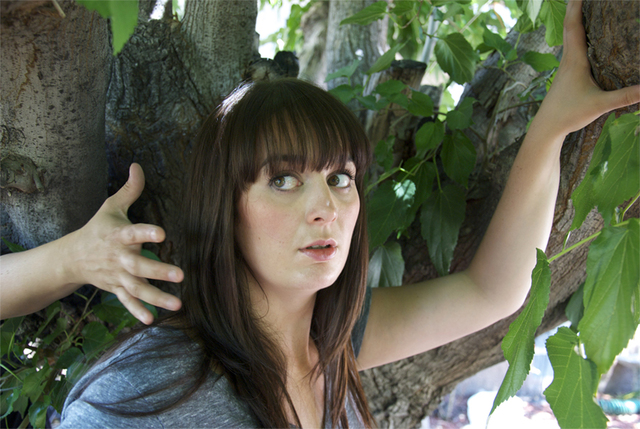Everything is changing in Catherine’s world. She’s getting older. Her grandmother is dying. Even the snowy woods where she grew up are growing temperate. She’s being forced to adapt to a reality she is reluctant to accept.Catherine is the titular character in local playwright Mars Mráz’ latest effort, Little Red , a reimagining of the durable "Little Red Riding Hood" folktale. Catherine, in an honest performance by Erin Phillips Mráz, is young and naive, unable or unwilling to see the brutal reality of the world. That’s why she falls prey to the Big Bad Wolf.The playwright’s evocative interpretation adds depth and dimension to the well-known story. It is November, and Catherine’s grandmother—the only family besides her father she’s ever had, and the toughest person she knows—has suddenly grown sick. When she realizes the elderly woman may not survive until Christmas, Catherine makes it her mission to keep her grandmother alive forever. But stationed around-the-clock at her bedside, Catherine discovers something strange: Grandma is sneaking out of the window at night, compelled by a faraway wolf call. Her health is inexplicably restored. Catherine soon follows her into the woods, where she comes face to face with a powerful force she doesn’t understand. Little Red is a moving examination of our own helplessness against the inevitability of change and loss. Catherine fights mightily against the passage of time—a force that overpowers her figuratively and literally as it’s embodied by the wolf, played by Nathan Simpson. Our protagonist’s struggle against this unstoppable element is central to the coming-of-age story that Little Red tells. That’s why it’s disappointing to see the wolf’s portrayal so overlooked and underdeveloped. He’s on stage from the beginning of the play—sometimes a passive observer, sometimes moving the story along by manipulating the set or invisibly influencing a character’s movement. But dynamically speaking, his presence is woefully weak. There should be a frightening, animalistic quality to the wolf that reminds us constantly of what he is capable of and what he is—vicious, dangerous and above all, imminent. The threat of his presence should be keenly felt, both by the audience and by Catherine. Instead, this wolf lacks any distinctive physicality. His aspect is unremarkable and nearly invisible. It’s unclear whether the lack of dynamism was an artistic choice made by the director or actor, but without effectively capturing the creature’s terrible, awe-inspiring nature, our heroine has nothing to contend with. Her journey becomes untethered, the symbolism is muddied and the dramatic tension of the story goes slack. Catherine is battling death, change and aging, and in the end, she loses—as she must. But we don’t see that struggle soon enough. It becomes difficult to fully grasp the tragedy as she, in the climactic moments, succumbs to a much stronger power. Still, it’s clear that Mars Mráz has penned an intricate, multilayered work. It’s not the type of play you see and promptly forget. This is meaty theater, with a lot to chew on before you get to the bone. With the arrival of the climax, the story explodes into almost pure allegory. Don’t be surprised if you find yourself deep in conversation on your way out of the theater, asking your companions things like: “What about the fire? What do you think that meant?” For those who get a high from parsing out the subtle symbolic intricacies of a story, Little Red is a heady cocktail.
Little Red Runs through Sept. 16Thursday, Friday and Saturday at 8 p.m.Sunday at 2 p.m.
Tricklock Performance Laboratory 110 Gold SW Tickets: $15 general admission, $12 students and seniors, $5 student rush tickets available five minutes before show time254-8393,tricklock.com










